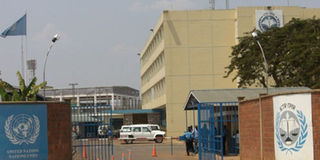ICTR releases 2 in last judgement

Offices of the International Criminal Tribunal for Rwanda in Arusha.
What you need to know:
Those released are Sylvain Nsabimana and Joseph Kanyabashi. The two had earlier been convicted by the Trial Chamber of the UN Tribunal but the Appeals Chamber set them free considering the time they had served in jail.
Arusha. The International Criminal Tribunal for Rwanda (ICTR) wound up its business yesterday after 20 years by releasing two of the six convicts who had earlier been jailed for long terms for their alleged role in the 1994 Rwanda genocide.
Those released are Sylvain Nsabimana and Joseph Kanyabashi. The two had earlier been convicted by the Trial Chamber of the UN Tribunal but the Appeals Chamber set them free considering the time they had served in jail.
The Appeals Chamber comprising Judge Fausto Pocar as Presiding Judge delivered its judgement on the appeals lodged by Nsabimana and Kanyabashi and four others; Pauline Nyiramasuhuko, Arsène Shalom Ntahobal, Alphonse Nteziryayo and Élie Ndayambaje who had their sentences reduced.
The last judgement of the Appeals Chamber brings an end to the Tribunal’s judicial activity. ICTR was formed by the UN Security Council in December 1994 to arrest and prosecute perpetrators of the genocide in Rwanda in 1994 during which nearly one million people were massacred. The final judgement issued by the Tribunal yesterday at its rented premises in the Arusha International Conference Centre (Aicc) brings the total number of appeal judgements issued so far to 45, disposing off appeals concerning 61 persons.
The Appeals Chamber dismissed the prosecution’s appeal alleging that the Trial Chamber erred in acquitting Kanyabashi of genocide and direct and public incitement to commit genocide in relation to the speech he gave at the April 19, 1994 swearing in ceremony of Nsabimana as prefect of Butare, one of the regions hard hit by mass killings during the genocide.
The Court also reviewed appeals by Ms Pauline Nyiramasuhuko who served as minister of Family and Women’s Development under the interim government that was formed in Rwanda immediately after the killing of President Juvenal Habyarimana, her son Arsene Shalom Ntahobali, Alfred Nteziryayo and Elie Ndayambaje.
On June 24, 2011, Trial Chamber II convicted Nyiramasuhuko, Ntahobali, Nsabimana, Kanyabashi, and Ndayambaje of genocide, crimes against humanity, and one or more serious violations of Article 3 common to the Geneva Conventions and of Additional Protocol II.
The Trial Chamber also convicted Nyiramasuhuko of conspiracy to commit genocide and found Nteziryayo, Kanyabashi, and Ndayambaje guilty of direct and public incitement to commit genocide. It also sentenced Nyiramasuhuko, Ntahobali, and Ndayambaje to life imprisonment and imposed sentences of 25, 30, and 35 years of imprisonment on Nsabimana, Nteziryayo, and Kanyabashi, respectively.




